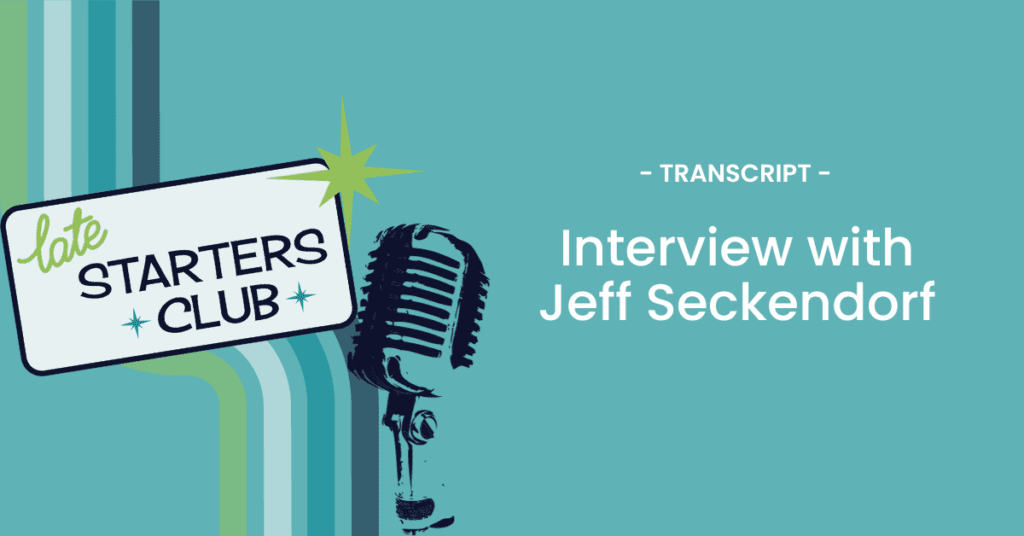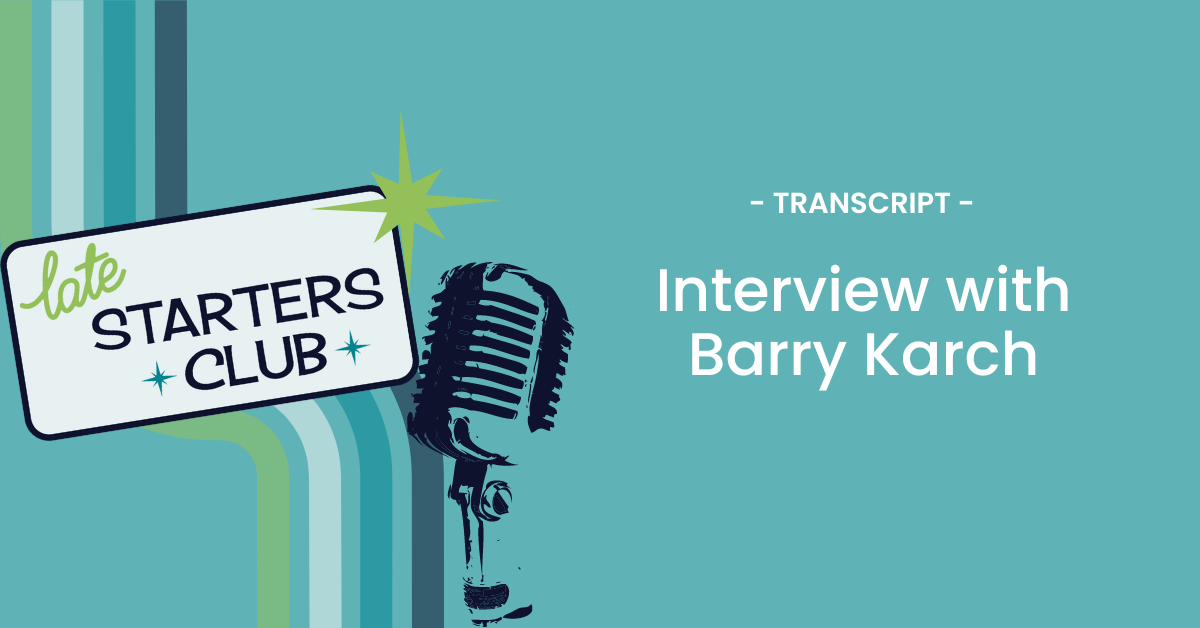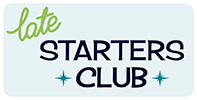Subscribe Apple | Google | Spotify | Stitcher | iHeart Living the Dream Overseas with Christine Gritmon Have you had a lifelong dream to live overseas and haven't made that happen yet? Maybe things have gotten in the way like family, jobs, life. My...
Ep162 Transcript: Interview with Jeff Seckendorf

Andrea_Vahl: My guest today is a little bit crazy. He is attempting to break the hour record on a track cycling at age 70. He’s training right now and didn’t start seriously competing until his late fifties. Join me in listening to how Jeff Seckendorf is attempting this record and where The Institute of Purpose comes in to play.
Hello, dreamers. Welcome to the Late Starters Club, giving you the inspiration, mindset, and tools you need to start something midlife and beyond. Remember, it’s never too late to follow your dreams.
Hello, Late Starters. It’s your host, Andrea Vahl, and today I am joined by Jeff Seckendorf, who is doing something a little crazy.
Jeff_Seckendorf: I guess if you put it that way, right?
Andrea_Vahl: Jeff is attempting to break the age 70 to 74 bicycle hour record on a um, Uh, what’s the kind of track you call that? A track, a velodrome. Just indoor, a velodrome. Yeah, a velodrome. Yeah. Yeah. So you are in the midst of training for that. You started seriously biking in your fifties and decided to…
Jeff_Seckendorf: no, I started seriously biking 50 years ago, but I started racing about when I turned around 50.
Andrea_Vahl: Oh, yeah. He started racing when you turned 50 right, right, right. So, we’re going to dive into all of that, including some of amazing things that you’re doing with The Institute of Purpose. But just to, just to kind of round it off he’s a master athlete, small business owner and the driving force of The Institute of Purpose, just to give you your official bio here, but I’m so excited to have you on the show.
Jeff_Seckendorf: Yeah. It’s great to be here. It’s great. It’s great to have a chat with you.
Andrea_Vahl: Yeah. So let’s dive into this, whole goal and where this started from and, how you’ve been training to just make this all happen.
Jeff_Seckendorf: Yeah. I’ve been riding a bike forever and you know, sometime around age 50, I just thought I should expand a little bit.
Cause I was always a pretty good runner. I’m a horrible swimmer, but I thought I’ll try some triathlons. And so, I tried to learn how to swim and you know, triathlons, the joke about triathlons, it’s swim, bike, run. So try not to, drown, crash or fall. And I did like four or five, six years of triathlons, and I did actually pretty well because I could run and I can ride a bike, but, I’d come out of the water and all the bikes would be gone. So I did that. And then I had this epiphany on my 60th birthday that I would stop running. And all my friends who ran were injured and their knees were screwed up and their hips were screwed up and my hips and knees were fine.
And I just saw the writing on the wall so I just thought I’m going to stop running period. And I went full on into the bike and about that time, somebody introduced me to the track and track racing. Track racing is really cool on the bike at the master’s level. And at the, the local level, because it’s, it’s a bunch of people sitting around the infield, telling jokes, having stories, having fun, and then you go race your bike for eight minutes and you go back and you sit down and you tell more jokes and you have more fun, you tell more stories.
So that might just be my sport. Huh. So I got totally wrapped up in track, track riding, track racing. I teach now the introductory and upper level courses on the track. I’ve podiumed at state competitions, and then I started looking for something that was a little bit longer than two, three, four minute races.
And then this hour record thing shot in front of me. And I thought, wow, that might be interesting. And it’s hard. I’m finding.
Andrea_Vahl: Yeah. What is the current record here that you’re attempting to break?
Jeff_Seckendorf: So in my Age group at 70 and actually almost the same at the 65 plus age group.
It’s about 44 kilometers in an hour, which is about 27, about 27 miles in an hour.
Andrea_Vahl: Yeah. So you’re constantly racing at 27 miles an hour essentially. For an hour. Yeah. For an hour. That’s not just, yeah, it’s not just like a, A little, short distance. That’s amazing. And then on the shorter distances, how fast are you typically going?
Jeff_Seckendorf: Oh, I don’t know, 30, 32, something for my age group around in there. Yeah. Yeah. For two and a half minutes or something like that for a 2k or 500 meter race. .
Andrea_Vahl: That’s, that’s wild. And it’s
Jeff_Seckendorf: I do better and longer stuff. I like, okay. My body likes. Turning on the engine and just going.
Andrea_Vahl: Right. The endurance, the endurance kicks in, and I’m the same way.
I’m a, I’m like the tortoise in the race, slow and steady.
Jeff_Seckendorf: But you will always get to finish.
Andrea_Vahl: Exactly. Exactly. You decided, hey, let’s, you started getting interested in, in longer stuff and you were podium, podiuming if the verb form and where did this aha, I’m going to really go for this record come from.
Jeff_Seckendorf: I had toyed with it a little bit and then I ended up having to switch coaches because of some personnel changes in the company I was with. And that particular coach, I said, I have this crazy idea that I want, this was, I don’t know, three years ago, maybe I want to do this hour record at 70.
And she was like why don’t you just do it now? I’m like well. I couldn’t really come up with a good reason not to. Yeah. So we, we trained for that and in very, in a very short period of time and I established the hour record for my age group at our local track at the San Diego Velodrome. And then, you know, it’s like, well, that was hard.
So maybe I should do something harder and and then through a whole series of events, I ended up having to switch coaches again. Then I found the guy who really, really knows how to get somebody to this point. And that’s who I’ve been with now for a couple of years and he’s doing an amazing job with me and I’m doing, the best I can with him.
Yeah. And it’s a five year process.
Andrea_Vahl: Yeah. Yeah. That’s, it’s, that’s incredible. So how often are you training? What’s the training like?
Jeff_Seckendorf: Yeah. Six or seven days a week. Yeah. And I’m on the bike at least five, sometimes six, and then the gym a couple of days and all the other stuff, core and functional strength and mobility and all that other stuff.
It’s a full time job. Yeah.
Andrea_Vahl: Yeah, that is. It’s incredible. It’s just, definitely not for the faint of heart, I think clearly from your, Institute of Purpose uh, founding that business kind of shows the type of person you are in going after hard things, right?
Jeff_Seckendorf: Yeah, it seems to, and I’m still working full time. whIch sort of, I think plays to your audience, right? This, yeah, I’m, I’m in my late sixties and I’m still working. I still love it. And I don’t see retiring because I would just probably do the same thing, but without the money.
So yeah, I don’t, I can’t quite wrap my head around why I would want to do that.
Andrea_Vahl: Why not get paid, get paid well for what you’re, what you’re contributing to the world.
Jeff_Seckendorf: And what I love. So that’s, that’s all good. So it’s like another part time job or almost full time job. But but yeah, The Institute of Purpose, that’s a really cool project that we just started.
Andrea_Vahl: Yeah, let’s dive into that and how that came about and kind of the the mission of that business I’d love to hear more.
Jeff_Seckendorf: You know I it’s it’s an interesting story because The Institute of Purpose doesn’t have a money model and I don’t usually do things that don’t but this one doesn’t have you know a clear vision of how it’s going to become profitable, and I think that, that freed us up to do whatever we wanted.
So I was having coffee with a friend of mine, and we’re just talking about all sorts of other stuff, but it was related to purpose, and he said, I’ve got this name that I want to do something with, and I don’t know what he’s like you know what? And he said, it’s The institute of Purpose and I just thought that was like the best name for anything I’ve ever heard.
Yeah. I just loved it. And then, it’s kind of like, remember in high school, like people would spend forever trying to name the band before they got the band. And then they’d go oh crap, we don’t have a drummer, and oh crap, we don’t know what we’re playing. Are we, are we jazz? Are we blues? Are we rock? Are we reggae? But I’ve got this name and that’s kind of what The Institute of Purpose was like. We had this cool name and a URL and no idea what to do with it. And we tried all sorts of little different things poked around in there. But eventually what we came to, because it doesn’t need a money model, is that we would make it a repository for people talking about what is their purpose. Right.
It’s super simple so I’ve got a collection of I don’t know it’s up to 20 or 25 little short 30 second videos People just what’s your purpose like you could do one today if you wanted to you know Yeah Is we just grab people and then I have a few I came out of the film industry a long time ago So right So then I have another three or four short documentaries, five to 10 minutes that on, on those stories that are more interesting.
So we’re just gonna, we’re basically using it as this place for people who feel like they need a little guidance on how to establish or reestablish what gets them excited every morning. What, what makes you get out of bed and do something, and I think the other thing that’s so interesting about this, Andrea, is that when you listen to those 20 short videos, they’re all the same. Yeah. And nobody heard anybody else’s. I didn’t prompt anybody. It’s Hey Andrea, what’s your purpose? They’re all the same. My purpose is to help people. It’s so interesting. It just so shows this community of people who’ve just, they’re only constant thread is that they know me from one way or another. Have all just decided to tell the world in some way or another, the reason they get up in the morning is to be of service. And I just thought that was super cool. So I just keep doing that.
Andrea_Vahl: Yeah. Yeah. And that’s such a powerful, I mean, that’s the thing.
I think especially in the mid-point of our lives here, we, we are coming up against that question. What, what am I here for? What do you know? We’ve, we’ve, done things like raised families or, invested in our careers or whatever, and now at this point, we’re, looking for something a little bit bigger, a little bit deeper, a little bit more meaningful and and really identifying who am I really and who, what do I want to contribute here on this earth?
So I love, I love that mission and just the stories that, people are telling cause it’s, it’s huge. And then we realized, hey, we’re, we’re all, we’re all the same.
Jeff_Seckendorf: We’re all going down the same road. Now, I’m sure it’s not everybody, but it is, it is the people who have come into my little, little circle of vision.
Andrea_Vahl: Yeah. And, and I think that when we’re in service, there’s so many things that talk about. Like true happiness comes from serving others and really feeling like you, you’re, you’ve got community and everything like that. So I think that’s, that’s a big thing as well.
Jeff_Seckendorf: Yeah. It’s cool to see it grow at a pace that, it’s, it’s a passion project, right? We don’t, we don’t put a lot of energy into it, we, I race in the. bicycle clothes that have The Institute of Purpose written all over them. And every once in awhile, somebody asked me about it.
Andrea_Vahl: Yeah, yeah, that’s awesome.
It’s really fun, that’s awesome. Yeah. Do you think there’s, a lot of things with goal setting that people look at as well as just setting goals, but you were talking about that in the, you know, what is your purpose and looking at, how do we set goals, but is that something that comes up for people?
Is that in achieving certain goals or working towards certain goals? And like certainly with this goal that you have, is that. Is that something that you found as people have you’ve interviewed or?
Jeff_Seckendorf: You know, I think that comes through a coaching model. I’m, I’m obviously I’m coached as an athlete and my, my real, gig is that I own a scuba certification and training agency, UTD scuba diving. And so we were trying to figure out in UTD how we could reframe scuba education. And this is just my own little niche company that I just have had for a long time. How we could reframe scuba education in a way that would make the training better and make the people better.
Cause you know, coaching in sports. Doesn’t like on the bike it as a coached athlete. I’m not just getting faster on the bike. I could do that with an online program it wouldn’t matter. What I’m getting on the bike is better. I’m better about the mechanics of cycling, nutrition, hydration, the mental aspects, all that other stuff, right?
So, coaching just makes you overall better at what you’re doing. So we took that same exact model and my training director in UTD is a triathlete. So he’s also coached. And we said let’s do a scuba coaching project. So we took the same software we were both using and we built workouts, I’m doing air quotes if you’re listening to this, which are, academic chapters and podcasts and videos and equipment stuff and the other. And then we, from a semantic standpoint, we said all right, now our, our scuba instructors are now coaches and our scuba students are now clients. So we just reframed it in our own minds and people are coming into this program.
It’s wildly successful because we’re now slowing down the process of education from two weekends or five days to maybe a year. And we have the opportunity to guide people through a training program that not only makes them certified, but makes them better. And it’s, it’s been this really cool way to bring to the world a model that no one ever thought of that works really well.
And and somehow answers your original question, which I’ve since forgotten. .
Andrea_Vahl: No. Yeah. We were talking about goal setting for Oh, and goal setting,
Jeff_Seckendorf: Yeah. So that was it. So in the goal setting in scuba, it’s always been my goal is to get, a certification card so I can go diving, but Right.
What we’re doing is we’re trying to turn that over a little bit and say, what if we just made the goal making you better? Yeah, and scuba is interesting because there are it’s really hard to find metrics other than certification like on the bike It’s easy, what’s your speed?
What’s your power? What’s your heart rate? What’s the same thing scuba? It’s like what you know? Yeah, we did we had this long conversation with a couple of instructors and one of them came up with the idea that the the metric is satisfaction But that was really cool, right? So was it a satisfying dive?
Metrics are high. Was it an unsatisfying dive? The metrics are low. Yeah. So I think when we look at all of this and we say let’s just, let’s turn goals over and make them something that is much more involved in process, so the process of getting to that goal is the thing and the goal is secondary.
Yeah. Yeah. So that’s how I look at it.
Andrea_Vahl: I love that. Cause that’s just a by, then it’s just a byproduct and the goal is the joy of the journey, right? The joy of, that’s it. And, we’re so often not measuring that. We’re so often measuring, hey, did you get to the top of that mountain? Yeah. I had a horrible time, but I made it.
Jeff_Seckendorf: Yeah. Yeah. Writers, I know writers who, who’s, who, who only love having written. Huh. It’s okay, here’s the book or here’s the screenplay or here’s the article. It’s cool. It’s done. But done takes 30 seconds, push send, send it off, whatever it is. If you hate the two years that got you there. Exactly.
For the 30 second joy of sending it, that’s right. And that goes back to your mountain thing too. It’s like, you know, you can climb it because it’s there, right? You can climb it because you get to go through a process of training and mental preparation and all that. And maybe joyfully bring that to somebody else to say, hey, you want to come on this journey with me?
You can do everything. You just don’t have to climb. I’ll take you on my journey. I’ll take you on my process, and then you can decide if you want to go and have your own goal or not. It doesn’t really matter, but to share that process is cool on the bike, I teach these introduction to track classes and I get to share my bicycle journey on this whole hour record thing, long time trials, stuff like that, with new people, and they get to go on my journey with me.
They don’t have to go ride the hour, but they can go on a journey with you. That’s cool. Yeah.
Andrea_Vahl: I think that’s it. Because I mean, in the end you may not break the record, right? And if you didn’t enjoy the journey along the way and the only goal was, was that, that little, piece of paper or whatever you get when you.
Jeff_Seckendorf: Literally, that’s all you get is a piece of paper and it’s such a niche of a niche of a niche that it’s not like, you know, right. definitely doesn’t have a money model.
Andrea_Vahl: Yeah. So I would love to dive into, as an athlete, what it’s been like, especially training as an older athlete, where have you gotten frustrated or overwhelmed or how has starting this whole thing later in life been a factor? And that’s probably two questions in one, but, what have you done when you’ve been overwhelmed or frustrated? And then, how, how have you felt like age has enhanced this goal that you have?
Jeff_Seckendorf: Oh, that’s a really, really good question. So, aging up as an athlete has a crossing point, right? As you age up, our bodies work their way down.
And as you train harder, our fitness level can go up. The point of, of an event is in. older athlete is to catch it at that crossing point, right? Where you haven’t started to tumble and your training has brought you to the highest particular point. And sometimes that point gets really elusive. And I still, I think everybody does this, I know my mom did this deep into her eighties.
I still act like I’m 30 on the bike. It’s I’ve just, I’m unwilling to believe that I’m actually slower than I was five, 10 years ago. I don’t even allow that thought to come in. But when I look at the data, it’s like, Oh that’s different. So I think a lot of it is just staying on. Having the tenacity to say I don’t really care.
My coach Ben Sharp said to me one day, a lot of people try for records and don’t succeed. And I was like, Oh, well, now what, but I, I then realized that, it’s okay. If it’s not successful, because it goes back to what we just talked about, which is what is successful is, my gym session this morning and my ride yesterday and my ride today and my race that’s coming up this weekend, those things are successful.
So as long as those pieces are successful, If I can’t get to 44 kilometers, I can get to 43, great. I’ll probably save myself 20, 000 worth of traveling and I’ll do something else that’s equally as fun or as difficult and equally not as age appropriate, so I just keep going.
And I think that the key is when it. When it gets tough to go back to what you know works, tenacity works, consistency works, compliance works, if you’re in any kind of, exercise program, training program, gym program, anything, as long as you’re compliant, which leads to consistency, it works.
You talked about it earlier about, the outcome, we always say if you do the process, the outcome is inevitable that you might not win the race because you can’t control anybody else’s outcome, right? You can do your best. And as long as you do your best, you could, you could call it a win, even if you’re not on a podium, so I think that’s how to, that’s how to manage the slowdowns is to just to say I’m doing my best.
Andrea_Vahl: There’s so much mindset that comes with all of this, especially, in any endeavor that is hard, that is um, you know, big, that is, you know, something that other people aren’t doing.
You’re going in a place where not many people have gone before, right? It’s not just yeah, I had a successful grocery shopping trip today,
Jeff_Seckendorf: that’s a thing, right? Think about it, right? If mobility is an issue, right? Cognition is an issue. It might just be that, that is a big event and a successful.
Yeah. It just could be a really good day,
Andrea_Vahl: Yeah. And I think that’s it too, is, you touched on it too, is just really being happy with that, with that result of the day, of the moment, of the, you know, just really appreciating and having gratitude for what you’re able to do and what you are doing.
And I think everyone has setbacks, it’s hard to get through them, but I, I think as we get older, it’s easier to manage the mindset around some of these setbacks. Cause we’ve had a lot more of them.
Jeff_Seckendorf: Yeah. And I think as I also, as I age up, I I’m much less concerned with the past and the future.
I really have just had the best life. I’ve done such cool things. I’ve got a great wife, grandkids, functioning business, fun hobbies, sports, blah, blah, blah. So I’m, I’m much more interested in what’s happening today than I am. Texting my way into the future or, reading my way through the past.
I don’t, it doesn’t really matter what I’ve done, what matters is that today’s fun. I have some purpose. Hopefully, my, my little bike ride is motivating somebody else to get off the couch or, do something hard physically, which of course makes. For all this good mental and mental health and just keep doing it day after day today.
Right now. Yeah.
Andrea_Vahl: I love that. That’s yeah. So true. So true. This has been super awesome. I always like to round out our wrap up our interviews with a favorite motivational saying or inspirational quote. Thank you so much. And Dive into that a little bit. So, do you have something to share with our listeners?
Jeff_Seckendorf: So can I, can I do two?
Andrea_Vahl: Yeah. It’s so funny because everyone’s, everyone has two and I’m always, I love, I’m such a quote junkie. So I’m like, yes, by only you could do 10
Jeff_Seckendorf: if, yeah, two would be great. Yeah. Larry King once said, I never learned anything while I was talking. I thought that was really cool, really cool, right?
It’s just stop talking and listen, or ask questions and then actually listen. And then the other thing I saw in a workshop that I was teaching, if somebody wrote this on a, on a whiteboard in a classroom and then walked away from it. So I don’t know where it came from, who said it, whatever it is, but it’s vision without action, is a daydream, and action without vision is a nightmare. And I love that, right?
Andrea_Vahl: That is great. Those are both. And the kind of amazing thing about all my guests is all my guests, I, I don’t think we’ve barely ever repeated a quote in the year long of interviews I’ve been doing at this point. So I love that.
And that is, those are both really, really amazing. So I love it. That’s love it. So where can people learn more about you? And we’ll definitely have all the links to the, the show notes and everything like that. Where, where can people find out more about you?
Jeff_Seckendorf: Yeah. I just start with The Institute of Purpose.
There’s, my speaking resumes up there and the contact info, and you can watch these little videos. And, if I can talk you into doing one, we’ll, we’ll knock one of those out because they’re really fun. And then, I would, I would just. Institute of Purpose. org.
Andrea_Vahl: Great. Great.
And we’ll definitely also link to the YouTube video with Jeff’s little video with his, hour record attempt here that we’ve got. And you can take a look at that. It’s very cool. Thank you so much, Jeff, for coming on and hopefully inspiring our listeners to just get out there and try something hard and, get after their purpose.
Jeff_Seckendorf: Yeah. No, it’s cool. I’m grateful to be here and really appreciate it. Yeah.
Andrea_Vahl: Thanks. Bye everybody. Bye
Hope that was helpful and make sure you grab the free guide top tools for late starters on the website at Late Starters Club. com and let’s turn dreaming into doing.
Join the conversation.
Let us know what you think about this episode.
Never miss an episode.
Subscribe to the podcast
You may also enjoy…

Ep170 Transcript: Finding New Motivation with Barry Karch
Finding New Motivation with Barry Karch Andrea Vahl: It's never too late to restart something you loved. My guest today, Barry Karch, started training for a marathon after a 20 year hiatus. And we'll also dive into how he climbed the equivalent of Mount Everest...

Ep169 Transcript: Questions to Kick Start 2024
Andrea Vahl: Oh, happy new year. Yeehaw. 2024. All right. I don't know about you, but I love planning out my year and setting goals and really reflecting on how my past year went and being super intentional about what I want the next year to look like. In today's...

Ep168 Transcript: Wrapping up 2023 with Gratitude, Grace, and Goals
Hello, late starters. It's your host, Andrea Vahl And today is Christmas day. And if you do celebrate that Merry Christmas, if you celebrate some other holiday, I wish you all the best and all the joy for that. I just wanted to make a different episode. So today we're...


0 Comments